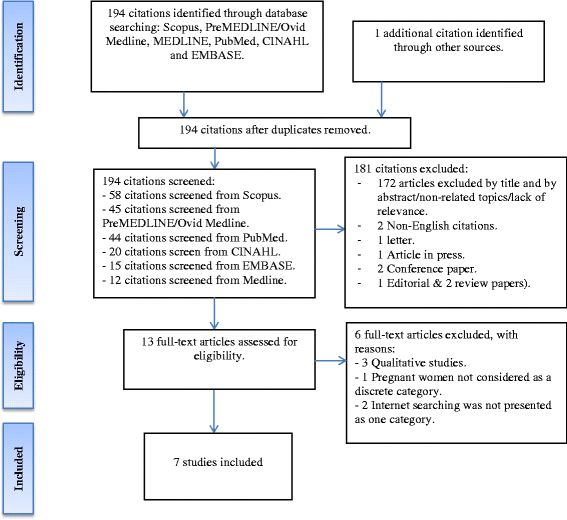Internet use by pregnant women seeking pregnancy-related information: a systematic review
- PMID: 27021727
- PMCID: PMC4810511
- DOI: 10.1186/s12884-016-0856-5
Internet use by pregnant women seeking pregnancy-related information: a systematic review
Abstract
Background: The Internet has become one of the most popular sources of information for health consumers and pregnant women are no exception. The primary objective of this review was to investigate the ways in which pregnant women used the Internet to retrieve pregnancy-related information.
Methods: We conducted a systematic review to answer this question. In November 2014, electronic databases: Scopus, Medline, PreMEDLINE, EMBASE, CINAHL and PubMed were searched for papers with the terms "Internet"; "pregnancy"; "health information seeking", in the title, abstract or as keywords. Restrictions were placed on publication to within 10 years and language of publication was restricted to English. Quantitative studies were sought, that reported original research and described Internet use by pregnant women.
Results: Seven publications met inclusion criteria and were included in the review. Sample size ranged from 182 - 1347 pregnant women. The majority of papers reported that women used the Internet as a source of information about pregnancy. Most women searched for information at least once a month. Fetal development and nutrition in pregnancy were the most often mentioned topics of interest. One paper included in this review found that women with higher education were three times more likely to seek advice than women with less than a high school education, and also that single and multiparous women were less likely to seek advice than married and nulliparous women. The majority of women found health information on the Internet to be reliable and useful.
Conclusion: Most women did not discuss the information they retrieved from the Internet with their health providers. Thus, health providers may not be aware of potentially inaccurate information or mistaken beliefs about pregnancy, reported on the Internet. Future research is needed to address this issue of potentially unreliable information.
Keywords: Antenatal care; Information; Internet; Pregnancy.
Figures
References
Publication types
MeSH terms
LinkOut - more resources
Full Text Sources
Other Literature Sources
Miscellaneous


